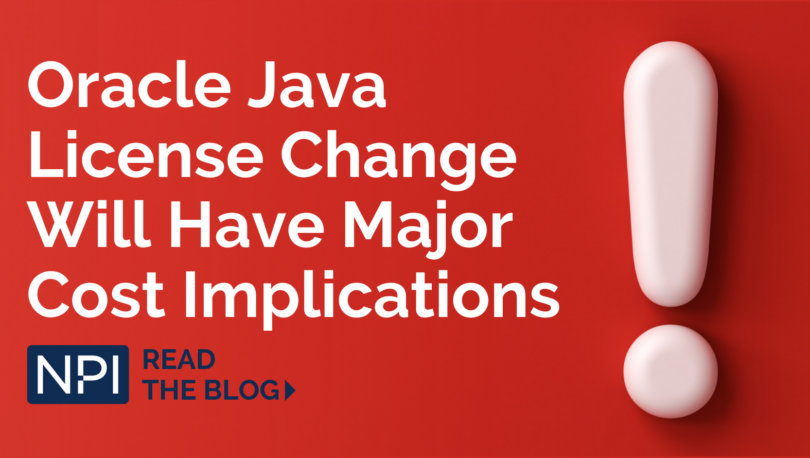A change to Java licensing rules could have major cost implications for Oracle customers of all sizes. Oracle recently announced a new pricing model for Java SE subscriptions. The Employee for Java SE Universal Subscription replaces the Named User Plus Licensing and Processor licenses (user and server licensing, respectively) and is based on the customer’s number of employees. Named User Plus and Processor licensing options will no longer be offered.
After analyzing Oracle’s pricing tiers, this change could equate to a 2x to 10x (or more) increase in Java related expenditures for some users. For example, in a company with 10,000+ employees, only 5% of those employees (~500) may need to utilize Java in their day-to-day operations. Under the new pricing model, however, the customer would need to pay for the other 95% (9,500!) regardless of whether they ever use Java.
Although Oracle claims these changes will only affect new Java customers, NPI is already seeing the vendor try to push existing clients to this new model – even those with tens of thousands of employees. Another layer of cost impact is the fact that these rules can encompass contractors and other adjacent partners.
The cost implications of Oracle’s employee-based Java pricing model cannot be understated and should not be underestimated. NPI strongly recommends enterprises take immediate steps to mitigate risk, which include the following action items.
Review How Oracle Java License Changes Could Impact Current Commitments
Priority number one is calculating the impact of potential changes should Oracle enforce licensing on an employee basis instead of named user or processor. NPI recommends evaluating the cost impact from a “worst case” scenario right away. Keep in mind a 10x expansion in costs may be a conservative estimate in some cases.
Most importantly, it would be useful to remind all employees that simply downloading Java could cause a major compliance issue with significant cost implications. Restricting access to Oracle’s corporate websites may sound like overkill, but it could minimize Java cost and compliance risk exposure.
Look to Extend Current Java Agreements Where Appropriate
Any enterprises with major Java agreements based on named user and/or processor metrics should consider whether it is prudent to ask their Oracle account team for a renewal of existing agreements before policy shifts further. This may be the last opportunity to keep legacy contract terms.
Oracle may enforce this change much more aggressively than it is alluding to in formal announcements. Engaging in renewal conversations now may be early enough to catch a break.
Perform a Formal Internal Java License Review and Position Assessment
NPI suggests enterprises perform a formal review of their Java licensing environment to get a clear picture of their Java license deployment – particularly in advance of any renewal of Java agreements. A haphazard approach to the next renewal could end up costing a fortune in Java fees. The open nature of Oracle’s announcement ascribes a fairly “carte blanche” approach to how Oracle can choose to enforce these rules on new AND existing Java subscription customers.
As part of this license position assessment, NPI recommends determining the cost to migrate away from Java entirely, as that may be a necessary exercise if Oracle decides to go all-in on enforcing this massive licensing change. From there, customers can evaluate if they should agree to this new license metric, minimize Java usage, or move away from Oracle Java altogether.
Are you a Java user? NPI’s Oracle licensing and compliance experts can help you analyze the cost impact of new Oracle Java license changes and determine the best course of action. Contact us to learn more.
RELATED CONTENT
